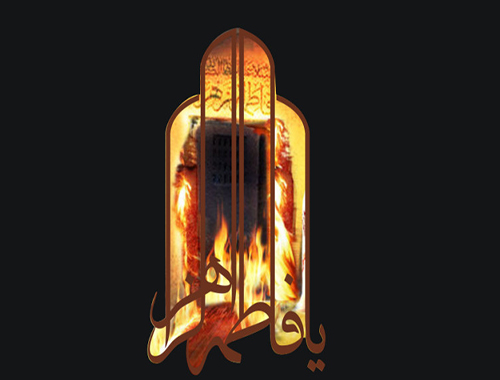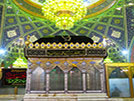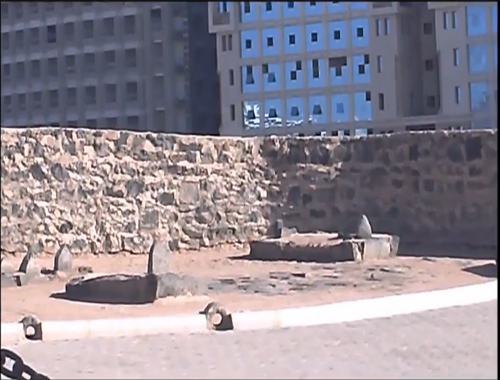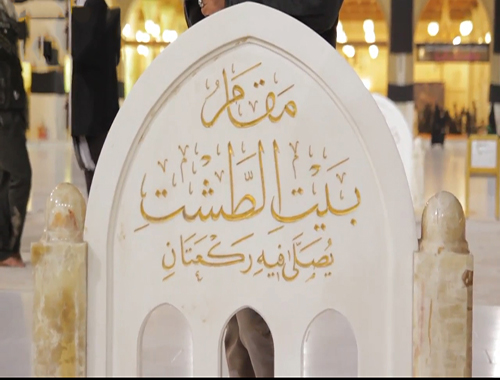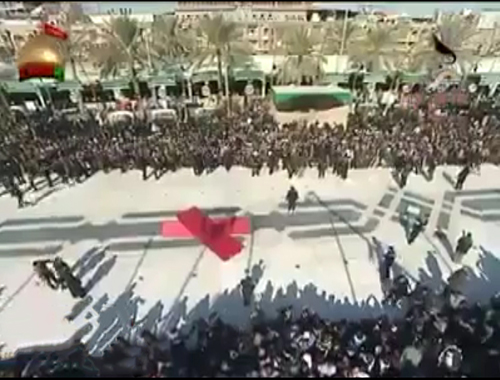Chapter10
- Details
- Hits: 3868
Chapter10
--------------------------------------------------------------------------------
After the death of the Prophet those companions who were critical of his action at Ghadir al-Khum and who opposed Ali, immediately got together at "Saqifah Bani Sa'dah" which was specially made for vain consultations (Ghayathul Lughaat) and a few individuals, whose number might have been about 200 and in whom both agreeing and disagreeing immigrants and supporters were included, laid the foundation of a personal government. When they returned to Medina from Saqifah, after the burial of the Prophet, they started demanding allegiance from people in order to give that personal government a collective and democratic form. To achieve this end they behaved not only with the dignified companions but also with the Ahlul Bayt in such a manner that humanity shudders even to mention it.
The gist of the painful story of this period is that Ali was compelled to swear allegiance (Rauzatul Ahbab) and on his refusal the army of the caliph took him to the court with his neck tied with a rope. (Ibn Abil Hadid Mo'tazali). Fatimah's house was set on fire. (Tarikh Tabari, Tarikh al-Imamah wa as-Siyasah, Mir'atul Uqul). The door of the house was dropped on Fatimah resulting in the miscarriage of her male child. (al-Milal wan Nahl of Shahristani). Allamah Mullah Mu 'in Kashifi writes that Fatimah fell ill on account of this shock, which caused her death. (Ma'arij un-Nabuwwah Rukn 4, chapter 3 p. 42). Then those who had refused fealty to Abu Bakr were forced with an iron hand to show allegiance, and some were badly beaten. Salman Farsi whom the Prophet had included in his Ahlul Bayt was also one of the victims of their tyranny. He was so severely beaten that his neck became tilted and the tilt lasted till his death.
The names of those who were in Medina and who refused allegiance to Abu Bakr are given below:
Imam Ali, Abuzar, Salman Farsi, Ammar bin al-Yasir , Miqdad bin al-Aswad, Khalid bin Sa'id, Burayda Aslami, Ubay bin Ka'b, Huzayma bin Thabit, Suhayl bin Hanif, Uthman bin Hanif, Abu Ayyub Ansari, Huzayfa bin al-Yamani, Sa'd bin Ubaydah, Qays bin Sa'd, Abdullah bin Abbas, Abbas bin Abdul Muttalib, Abdul Haytham bin Tayhan, Jabir bin Abdullah, Abdullah bin Thamit, Ubaydah bin Thamit, Abu Sa 'id Khudari, (Tabsaratul Awam p. 24, Ainul Hayat p.5)
It is written on page 43 of the same book (Tabsaratul- Awam) that after a few days Sa'd bin Ubaydah was killed with arrows on account of his refusal to pay allegiance.
Anyway, this political hoolinganism continued after the death of the Holy Prophet. Historians write that the land of Fadak, the property of Ahlul Bayt was confiscated only on account of this refusal of allegiance. These people said that Caliphate was Ali's inalienable right and he should get it. The details of this claim ate still available In Ali's sermon of Shiqshiqiyyah recorded.in Nahjul Balaghah. He has stated in clear terms that Caliphate was his right which was snatched away from him. He has also mentioned his attempt for the establishment of his claim as is seen on page 231 of the book an-Nihayah of Ibn Athir. Now we quote from Tarikh-i Ahmadi this great tragedy and catastrophic event which happened to the Ahlul Bayt and the sincere companions after the death of the Holy Prophet, so that the reader may know after all what happened to the progeny of the Prophet and his sincere companions only two weeks after the Prophet's death, and what role Abuzar played at that juncture.
According to Tarikh Ibn Jarir, Umar was present at the time of the Holy Prophet's death but Abu Bakr was not there. He was in the village Sakh. When the Prophet died Umar said, "According to the presumption of hypocrites the Prophet is dead, but I swear by Allah that he is alive".
According to al-Milal wan Nahl of Shahristani Umar threatened to kill the man with his sword if he said that the Prophet was dead. This incident is also recorded in other books such as, (Tarikh Abul Fida vol. 1, p. 164, Tabaqatul Kubra vol. 2, p. 271, Sunan Ibn Maja vol. 1, p. 571, Hadith 1618, Musnad Ahmad bin Hanbal vol. 1.)
According to Rauzatul Ahbab the people started doubting the death of the Prophet when they heard this threat of Umar At that time Abu Bakr was in his house at Sakh. When he was informed of the death of the Prophet he immediately rode to Medina and on reaching Masjid an-Nabi saw that the people were in a melee.
According to Tarikh Abul Fida when Abu Bakr witnessed this condition of people he recited the verse meaning: "Muhammad is but a Messenger of Allah and before him also many messengers (like him) have passed away. Should Muhammad die or be slain, would you then turn back to your pre-Islamic behaviour?" (Surah Ale Imran, 3: 144 ) Hearing this people became convinced of the demise of the Holy Prophet. After that, all of them hastened to Saqifah Bani Sa'da.
According to Tarikh Ibn Khaldun Abu Bakr on reaching Saqifah said, "We are the companions and kinsmen of the Prophet and hence have a better claim to the Caliphate of the Prophet than anybody else".
According to Tarikh Tabari of Ibn Jarir Umar said to Abu Bakr: "Hold out your hand so that I may swear allegiance to you". Abu Bakr said, "No; you should hold out your hand because you are in every way more powerful than I". This tussle continued for sometime. At last Umar stretched the hand of Abu Bakr and promised loyalty to him and also said, "You should count my strength also combined with yours".
According to Tarikh Kamil of Ibn Athir, Umar and others promised loyalty to Abu Bakr, but all or some of the Ansar said, "We will not swear allegiance to anybody except Ali". According to Tarikh Khamis when Abu Bakr got relief from the work of allegiance he returned from Saqifah to Masjidun Nabi and took his seat on the pulpit. Here, too, he took allegiance till the day came to an end and the people failed to attend the burial of the Holy Prophet. It was Tuesday night.
According to Kanzul 'Ummal it is narrated by Urwa that Abu Bakr and Umar were not present at the burial of the Holy Prophet, but were present in the crowd of the "Ansar" (at Saqifa Bani Sa'dah) and the Prophet had been buried before they returned from there.
According to Nihayah of Ibn Athir Jazari, Majma' al-Bihar of Mulla Tahir Qutni and al-Milal wan Nahl of Shahristani, Umar said afterwards that the allegiance of Abu Bakr was an expected event but Allah saved us from its evil.
According to Tarikh Abul Fida a group of Hashimites and also Zubayr bin al-'Awam, Miqdad bin 'Amr, Salman Farsi, Abuzar, Ammar al-Yasir, Bara' bin Azib etc. siding with Ali kept away from swearing allegiance to Abu Bakr.
It is written in Isti'ab of Abdul Barr that when loyalty was promised to Abu Bakr, Ali did not promise loyalty to him and stayed at home.
According to Muruj uz-Zahab of Mas'udi, when on the day of Saqifah allegiance was promised to Abu Bakr, Ali said to Abu Bakr, “You ruined our affairs, did not consult us and did not regard our right". Abu Bakr said, "Your complaint is justified but I have done so for fear of revolt".
According to Rauzatul Ahbab when Abu Bakr became free from the work of seeking allegiance he called Ali through some Muhajir and Ansar. Ali came and asked, "Why have I been called?" Umar said, "You have been called to promise loyalty as others have done". Ali said, "I put before you the same argument, which you have presented before the Ansar to acquire the Caliphate. Tell me honestly the man nearest to the Prophet". Umar said, "We will not leave you unless you promise allegiance". Ali said, "Answer my question first and than ask me for allegiance". Abu Ubaydah bin Jarrah said, "O Abul Hasan! Only you deserve the Caliphate and administration on account of your priority in Islam and your nearness to the Prophet, but as the companions have agreed on Abu Bakr, it is better that you also join them. Ali said, "O Abu Ubaydah! You want to transfer to other place the great blessing which Allah has bestowed upon the Family of the Prophet. Look! We are the place of descent of revelation, the place of arrival of commands and prohibitions, source of virtue and learning, and mine of reason and forbearance". Hearing this Bashir bin Sa'id said, "O Abul Hasan! We presumed by your staying at home that you like to withdraw from the Caliphate". Ali said, "Do you people deem it proper that leaving the dead body of the Prophet (s) unwashed, unshrouded and unburied, I should have involved myself in the dispute and hospitality to seek the Caliphate?"
It is recorded in Usud ul-Ghabah that Ali quoted the Holy Prophet (s) as saying, "O Ali! You are like Ka'bah to which everybody goes, whereas it does not go to anybody. So, if the people of your group come to you to swear allegiance to you, accept it. Do not go to them till they themselves come to you".
According the Rauzatul Ahbab when Abu Bakr heard these things and saw that every reason and argument of Ali was as indisputable, solid and irrefutable as one thousand arguments, he said politely, "O Abul Hasan! I had presumed that you would not refuse allegiance to me. Had I known that you would withhold your allegiance to me I would not have accepted it. Now, as people have sworn allegiance to me I think you should also join them, if you like. But, in case, you have any hesitation in this connection I do not blame you". At this Ali rose from there and came back home.
According to 'Iqdul Farid by Shahabuddin ibn Abd Rabbihi Undlusi, the people who refused allegiance to Abu Bakr were Ali, Abbas, Zubayr and S'ad bin Ubadah. Of them Ali, Abbas and Zubayr stayed in the house of Lady Fatimah till Abu Bakr sent Umar to turn out of the house those who were staying there and to use sword if they refused to go out. Hence Umar reached there with some fire in order to ignite the house. When Fatimah came to know of it she said, "O the son of Khattab! Have you come to burn my house?" Umar said, "of course, I have come with the same intention, or else, those who are in this house should come out to promise allegiance to Abu Bakr”.
According to Tarikh Abul Fida Umar came with some fire with the intention of burning the house of Fatimah. When she came to know of it, she said, "O the son of Khattab! Have you come to burn my house?" Umar replied, "Yes, otherwise the people who are inside the house should swear allegiance to Abu Bakr".
According to the Tarikhut Tabari of Ibn Jarir, Umar went to the house of Murtaza (Imam Ali) in which there were Talha, Zubayr and some immigrants and said, "By Allah! I will burn the house otherwise you should come out for allegiance".
It is written in "Al-Imamah wa as-Siyasah'' of Ibn Qutaybah Dinuri that when Abu Bakr did not see in his company when allegiance to him was being faced, those who were with Ali, he sent Umar to call them to him. Those people were inside the house of Ali. They refused to come out. Umar sent for faggots and said, "Come out or by Allah I will bum those people who are inside the house by setting the house on fire". People said, "Fatimah, the daughter of the Holy Prophet is also in this house", Umar replied, "It does not matter", Hearing this all those people who were inside the house came out except Ali who addressing the people who had come to call him said: "O the group of immigrants! I have a better right to Caliphate than you in every respect. I will not swear allegiance to you. Rather, you should swear allegiance to me. Look! You got the Caliphate by putting forth the argument before the Ansar that you are related to the Prophet and (surprisingly enough) now you are trying to snatch away the Caliphate from the Ahlul Bayt of the Prophet. Do you not base your claim of superiority over the Ansar on the plea that the Prophet belonged to your tribe? Now I put against you the same argument which you had put against the Ansar that is, our relationship with the Prophet is, in every way, superior to and nearer than yours during his lifetime as well as after his death. Now be just and fair if you believe in Allah and fear Him. O the group of immigrants! Remember Allah and do not take the Prophet's leadership from his house to your houses". After that Fatimah said at her doorstep, "O people! Leaving the dead body of the Prophet to us you settled the matter of Caliphate in your favour and ignored our right".
According to Tarikh Ibn Qutaybah when Umar went to Abu Bakr he said, "Why do you not arrest Ali when he is opposing your allegiance?" Abu Bakr again sent his slave Qanfaz to call Ali to him. Qanfaz said to Ali, "The Caliph of the Prophet of Allah is calling you". Ali said, "So soon you people have slandered the Prophet". Qanfaz went back and he repeated to Abu Bakr what Ali had said to him. After hearing it Abu Bakr kept on weeping for some time. Umar said to Abu Bakr, the second time, "Do not give time to Ali who is withholding allegiance to you". Abu Bakr again ordered Qunfaz to go to Ali and say, "The Commander of the Faithful is calling you for allegiance. Qunfaz conveyed the message of Abu Bakr to Ali. Ali said loudly, "Allah be praised! Your master has claimed that relationship with which he has no connection". Qanfaz went back to Abu Bakr and repeated Ali's words. On hearing this Abu Bakr started weeping again. Then Umar rose and with a group of people went to Fatimah's house and knocked at the door. Hearing the shouts of people Fatimah began to weep and cry loudly, "O my father! O the Prophet of Allah! What a severe trouble has been inflicted on us by the son of Khattab and the son of Abu Quhafah! "When the people heard the wailings of Fatimah most of them went back weeping and only a few persons stayed behind with Umar. Then Ali came out of the house and went with them to Abu Bakr. There he was asked to swear fealty to him. He said, "If I do not swear allegiance then?" He said, "If you do not swear allegiance, by Allah, we will kill you”.
Ali said, "Will you kill a man who is a slave of Allah and brother of the Messenger of Allah?" Umar said, "We admit that you are a slave of Allah but we do not acknowledge that you are also the brother of the Prophet". Abu Bakr was absolutely quiet at that time. Umar said to him, "Why do you not order and sit quietly?" Abu Bakr said, "I will not force Ali in the life time of Fatimah". Then Ali rose from there and went to the grave of the Prophet and there he cried bitterly saying: "O brother! The people of the tribe have insulted me so much and were about to kill me".
Abuzar was seeing these things with his own eyes. He had in his mind what he had seen at Ghadir al-Khum. He was wonder-struck to see what was happening. In this state of wonder his faith suddenly stirred his sentiment and he ran up to Masjidun Nabi. His mind was agitated and perturbed and his blood was ebullient in enthusiasm. He was waiting for an opportunity to give vent to his feelings. When he reached the masjid he found a gathering of companions there with Abu Bakr and Umar also in their midst. His manly courage got excited and he started to deliver a speech standing on a raised spot.
He said: "O the people of Quraysh! What has happened to you? How careless are you! You have completely ignored the kinship of the Holy Prophet! By Allah a group of Arabs have turned apostates, and have created breaches of doubts in the faith. Listen to me! Caliphate is the right of Ahlul Bayt. This violence and brawl is uncalled-for. What has happened to you? You call the capable incapable and praise the incapable. By Allah all of you know that the Prophet has declared again and again "After me the Caliphate and leadership is for Ali, then for Hasan, then for Husayn and then my infallible progeny will hold this Office". You ignored the word of the Prophet and the command of Allah! You forgot that covenant and command which was made binding on you. You have done obeisance to the perishing world and have sold the hereafter which is everlasting, and in which the young will not grow old, and the blessings will not diminish, and the dwellers will not feel sorrowful or depressed and to which angel of death will have no access. You sold away such a valuable thing for a paltry price. You have done the same thing which the people of the Prophets of the past had done. They had broken the allegiance and gave up their faith when their Prophet died. They annulled the covenants, changed the commands and metamorphosed the faith. You have proved yourselves on a par with them. O group of Quraysh! Very soon you will get the recompense for your misdeeds and the punishment for your evil doing. That which you have sent through your conduct will come before you. Remember! Whatever will happen will be just, because Allah does not do injustice to His slaves. (Al-Ishtiraki az-Zahid p. 113)
The manly courage of Abuzar may be judged by this eloquent speech. It is obvious that he had a very sensitive heart and was endowed with boldness and courage.
Abuzar delivered this speech at a time when nobody could even utter a word. The army of the Caliph was bent upon strangling the companions of the Holy Prophet. Whoever hinted at the refusal of allegiance was beheaded. He who hesitated to swear allegiance was strangled. A brave man like Ali was tied by the neck with a rope, and a companion like Salman was strangulated and was beaten so much that he felt its torment till he breathed his last.
Shaykh Abbas Qummi writes that when Fatimah the daughter of the Prophet, being hurt from falling of the door, remained ill for some time and then expired. Ali did not, according to her will, give the news of her death to those who were planners in giving her trouble. Having finished with the bathing of her dead body Ali sent Imam Hasan to call Abuzar in order to help him in her burial, and he came along. (Safinatul Bihar, of Shaykh Abbas Qummi, vol. 1, p. 483)
Hafiz Muhammad bin Ali bin Shahr Ashob (died 588 A.H.) writes that the funeral prayers of Fatimah was offered by Ali, Hasan, Husayn, Aqil, Salman, Abuzar , Miqdad, Ammar and Buraydah. Another narration includes the names of Abbas bin Abdul Muttalib, Fazal, Huzayfah and Ibn Mas'ud also. (Manaqib Ibn Shahr Ashob, vol. 2, p. 65 printed in Multan)

